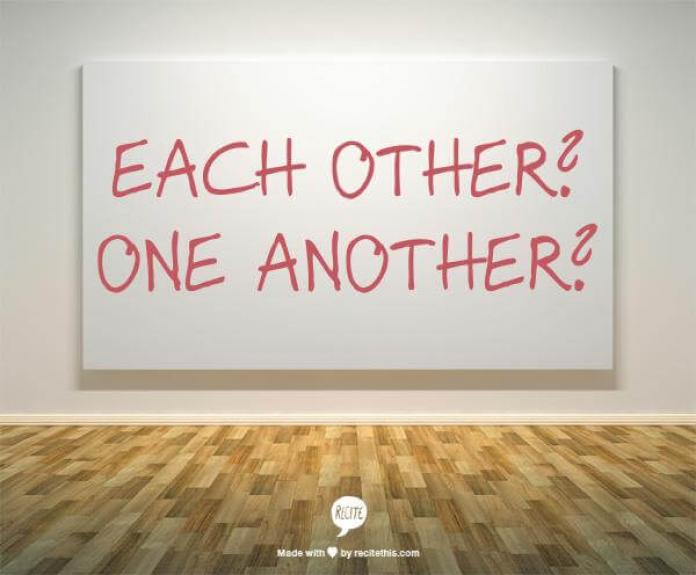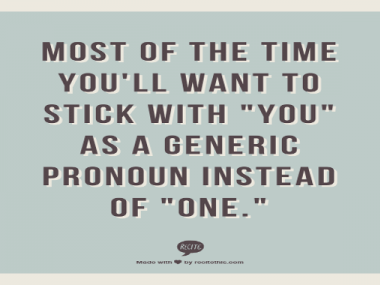‘Each Other’ Versus ‘One Another’
Is there actually a difference?
In the movie “Bill and Ted’s Excellent Adventure,” the slacker protagonists Bill and Ted offer this advice to the world: “Be excellent to each other,” and “Party on, dudes!” But are Bill and Ted running afoul of a rule regarding reciprocal pronouns?
‘Each Other’ Is a Reciprocal Pronoun
The phrase “each other” is known as a reciprocal pronoun because it shows a bidirectional action. For example, if Bill and Ted are being excellent to each other, that means Bill is being excellent to Ted, and Ted is being excellent to Bill. They’re practicing what you might call excellence reciprocity.
‘One Another’ Is a Reciprocal Pronoun
But Bill and Ted aren’t talking about being excellent just to Bill and Ted; they want each person in the world to be excellent to every other person. According to some grammarians, if we’re talking about more than just two people, we should use a different reciprocal pronoun: one another. In other words, Bill and Ted should more properly have said, “Be excellent to one another.”
Buy Now

English is unusual in having more than one reciprocal pronoun to choose from. It doesn’t set the record for the most reciprocal pronouns, because Korean has three, but most languages have just one. Chinese, Finnish, French, Classical Greek, German, Hebrew, Japanese, Russian, and American Sign Language, among others, all have just one reciprocal pronoun. Some languages, such as Spanish, Shoshone, and West Greenlandic, don’t even have that many. They use the same pronoun as both a reflexive and a reciprocal, so that the same sentence could mean either “We see each other” or “We see ourselves.”
‘Each Other’ or ‘One Another’?
The trouble with having a choice of reciprocal pronouns to use in English is that English speakers (and speakers of other languages, too) can’t stand to have more than one word with the same meaning. They’ll look as hard as they can for a meaning difference, and if one doesn’t exist, someone will create one.
It’s happened with “healthy” and “healthful,” with “continuous” and “continual,” and many others. According to the Merriam-Webster Dictionary of English Usage (MWDEU for short) the first person to state that “each other” should refer to only two people and that “one another” should refer to more than two was George N. Ussher, in 1785.
Grammarians Disagree About ‘Each Other’ and ‘One Another’
Since then many grammarians have weighed in, some accepting the rule, others rejecting it. Even today, there isn’t agreement. Some sources that accept it are Garner’s Modern English Usage, and “The Grammar Bible,” by Michael Strumpf and Auriel Douglas. Some that don’t are the second edition of Fowler’s Modern English Usage, and “Grammar Without Grief,” by Martin Steinmann and Michael Keller.
There are even sources, such as Ronald Wardhaugh’s “Understanding English Grammar,” that propose a version of the rule that goes like this: Use “one another” or “each other” when you’re talking about more than two people, but when you’re talking about just two people, use “each other.” That rule will never catch on. People don’t like rules that say option A is available in situation A, but option B is available in situation B and situation A. They prefer clean, two-way distinctions: option A in situation A; option B in situation B; end of story.
‘Each Other’ and ‘One Another’ Are Often Interchangeable
Despite these rules, both “each other” and “one another” had been used to refer just to two people, and to more than two, hundreds of years before anyone tried to force a meaning distinction on them.
The Oxford English Dictionary gives this quotation from Shakespeare, with “one another” referring to two people: “When we are married, and have more occasion to know one another.” MWDEU has this example from Samuel Johnson, with “each other” referring to more than two people: “Sixteen ministers who meet weekly at each other’s houses.” As MWDEU puts it, “the rule restricting ‘each other’ to two and ‘one another’ to more than two was cut out of the whole cloth.” For some more informative discussion of this issue, read Gabe Doyle’s post on “each other” and “one another” on his blog, Motivated Grammar.
The Safest Choice Is to Follow the Rule
Since there never was any historical support for this rule, but since there are people who believe in it today, should you follow it? Personally, I’d say no, but the good news is that it’s an easy rule to follow if you choose. Unlike using “whom” or saying “It is she,” limiting “each other” to two people and “one another” to more than two isn’t going to make your writing sound unnatural. Both sound fine in either situation, whether you’re observing or ignoring the rule.
Don’t Use ‘Each Other’ or ‘One Another’ as a Subject
While we’re on the subject of “each other” and “one another,” we do recommend following one restriction on their use. Specifically, don’t use them as the subject of a clause. For example, suppose Bill thinks Ted is awesome, and Ted thinks Bill is awesome. How could you write that in a single sentence? “Bill and Ted think each other are awesome”? “Bill and Ted think one another is awesome”? No. People do write sentences like that, and you may have heard people speak them, and you may have even spoken them yourself—I know I have. But it still sounds awkward, for reasons that are unclear.
MWDEU notes that “each other” as a subject hardly ever occurs in edited writing, and suggests that it might be because of confusion over whether to use a singular or a plural verb. It just goes to show that even when there is a logical need for a particular word, there is no guarantee that a word will be created to meet that need. This is especially frustrating, given all the words that are created when there isn’t a logical need for them, such as “irregardless” and “conversate.” The best you can do in this situation is to use what the Cambridge Grammar of the English Language calls the “split reciprocal” construction, and say “Bill and Ted each think the other is awesome.”
Compound Possession
That’s all for reciprocal pronouns, but I do have one last thing to say about “Bill and Ted’s Excellent Adventure”: The title is a great illustration of the rule for compound possession, which I discussed in episode 75!
‘Each Other’ Is Always Two Words
And finally, one more note for the people who are just learning English. “Each other” is always two words.
Resources
1. Maslova, Elena & Nedjalkov, Vladimir P.. 2011. Reciprocal Constructions. In Dryer, Matthew S. & Haspelmath, Martin (eds.). 2011. The World Atlas of Language Structures Online. Munich: Max Planck Digital Library. https://wals.info/ Accessed on 2011-06-22.
2. “Each other.” The Merriam-Webster Dictionary of English Usage. 1994.
3. Doyle, Gabe. June 6, 2011. Reflexive battle: “each other” and “one another.” Blog post. https://motivatedgrammar.wordpress.com/2011/06/01/reflexive-battle-each-other-and-one-another/ Accessed June 20, 2011.
“Each Other” image from ReciteThis.com





